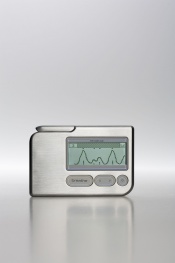Klinisch onderzoek (Engelstalig)
StressEraser Clinical Research
Published Research
Papers Accepted for Publication
Clinical Studies Still in Progress
Overview of Results
Published Research
Anxiety
Reiner, R (2008). Integrating a Portable Biofeedback Device into Clinical Practice for Patients with Anxiety Disorders: Results of a Pilot Study, Appl Psychophysiol Biofeedback, 33, 55-61. [view pdf]
HRV Accuracy
Heilman, K, Handelman, M, Lewis, G & Porges, SW (2008). Accuracy of the StressEraser® in the Detection of Cardiac Rhythms, Appl Psychophysiol Biofeedback, 33(2), 83-89. [view pdf]
HRV Biofeedback
Muench, F (2008). The Portable StressEraser Heart Rate Variability Biofeedback Device: Background and Research, Biofeedback, 36(1), 35-39. [view pdf]
Job Performance
Kennedy, J & Pretorius, M (2008). Integrating a Portable Biofeedback Device into Call Centre Environments to Reduce Employee Stress: Results from Two Pilot Studies, Journal of Workplace Behavioral Health, 23(3), 295-307 [view pdf]
Post Traumatic Stress Disorder (PTSD)
Zucker, TL, Samuelson, KW, Muench, F, Greenberg, MA & Gevirtz, RN (2009). The Effects of Respiratory Sinus Arrhythmia Biofeedback on Heart Rate Variability and Posttraumatic Stress Disorder Symptoms: A Pilot Study, Appl Psychophysio Biofeedback, DOI 10.1007/s10484-009-9085-2 [view pdf]
Papers Accepted for Publication
Anxiety/EEG
Sherlin, L & Wycoff, S (2009). Quantitative Electroencephalograph Effects as a Result of Single Session Respiratory Sinus Arrhythmia Feedback in an Anxiety Population.
Anxiety/EMT
Sherlin, L & Wycoff, S (2009). Respiratory Sinus Arrhythmia Feedback Impact in Novices on Limbic Current Source Density in a Stressed Population Demonstrated by Standardized Low Resolution Electromagnetic Tomography. [view presentation pdf]
Depression
Chaudhri, P (2009). The Effects of Cardiorespiratory Biofeedback and Dialectical Behavioral Skills Training with Sertraline on Post Myocardial Infarction Major Depression and Low Heart Rate Variability. [view presentation pdf]
Insomnia
Ebben, MR, Kurbatov, V & Pollak, CP (2009). Moderating Laboratory Adaptation (the First-Night Effect) with the User of a Heart-Rate Variability Biofeedback Device (StressEraser).
Clinical Studies Still in Progress
The indicated use of the StressEraser is for relaxation, relaxation training and stress reduction. The StressEraser is currently being tested in numerous controlled clinical trials at leading academic institutions for stress-related issues such as:
* Anxiety
* Asthma
* Depression (several)
* Insomnia
* Migraine Headaches
* Performance (occupational & sports)
* Post-Traumatic Stress Disorder (PTSD, several)
* Stress levels in physicians (cortisol, work related stress)
* Stress levels in pregnant women (cortisol, fetal motion)
* Stress levels in trauma patients
Overview of Results
Several StressEraser studies have been completed. Overall, results indicate users both prefer and find the StressEraser more helpful than other relaxation techniques. Immediately after using the device, users report significant reductions in feelings of stress-related anxiety, increases in feelings of calmness and relaxation, increases in cognitive performance and decreases in heart rate. Moreover, results indicate that the more efficient someone is at using the device, the more they report improvement in stress related symptoms of anxiety.
In the long-term, studies reveal that the StressEraser reduces feelings of stress-related anxiety and anger, increases objective indicators of work performance, and increases heart rate variability (SDNN). Several of the studies also found a long-term dose-response.
Side Effects
The multitude of trials conducted have revealed side-effects do occur in some individuals. These side-effects are short-term (15 minute duration) and mild. The most common side-effects are sleepiness, dizziness (usually the result of improper breathing) and mild anxiety due to watching ones physiology or improper breathing. Less common side effects are headaches, and finger numbness from the sensor clip. The research shows that side effects can be resolved by stopping use of the device.
Possible Contraindications
* People using a pacemaker that continually regulates heart rate will be unable to use the device.
* Some heart-regulating medications (especially high dosages) may make it more difficult if not impossible to manipulate the device as directed because they regulate heart rate and reduce HRV.
* Chronic low circulation and low finger temperature may make it more difficult to obtain a pulse reading on the device.
* Direct sunlight or significant movement will affect the device reading.

